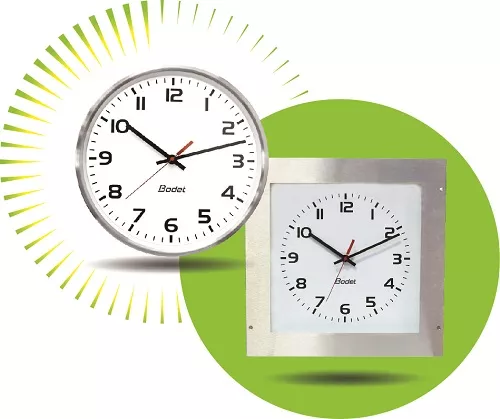In hospitals and other medical settings, accurate timekeeping is essential to maintain patient safety and run efficient processes. However, have you considered how the need for hygiene and cleanliness impacts on the time-management systems chosen for your healthcare setting?
Medical knowledge improves through the ages
The role of bacteria in disease, and how to maintain hygiene and control infections, is now accepted knowledge in healthcare. But it wasn’t always that way. It was a common belief in the 18th and 19th centuries that foul air caused and spread disease.
It wasn’t until the mid-to-late 19th century that several scientists and physicians began to make links, and knowledge of the causes of disease improved considerably. One of those was French scientist Louis Pasteur, who argued in 1861 that bacteria were the cause of disease. His research was further developed by surgeon Joseph Lister, who made connections between bacteria and infections.
In addition, Florence Nightingale identified cleanliness as one of five environmental factors to affect patients’ health, healing and wellbeing.
Healthcare settings must comply with hygiene regulations
Since the Covid-19 pandemic, cleanliness has been on our minds more than ever, especially if we have to go into hospital. Maintaining effective hygiene isn’t exclusively for medical equipment used in operations and patient care. It covers all the fixtures and fittings which people come into contact with in a healthcare environment.
In the UK, the Health and Social Care Act 2008 includes regulations to ensure that premises where care is delivered are clean and maintained. The Care Quality Commission (CQC), itself established by the Act, regulates and inspects services providing health and social care. It can hold providers to account if they fail to comply with the rules.
The regulations require hospitals and healthcare settings to keep up to date with legislation and guidance. They must clean, decontaminate or sterilise in line with these – and the manufacturers’ – instructions.
Healthcare settings need to be cleaned thoroughly and regularly. Therefore, it’s essential that equipment, including clocks, can withstand such high levels of cleaning and continue working. It’s not only germs; dust and dirt can get into clocks, for example during building works, and may stop them working properly.
Maintain safety with Bodet Time’s dedicated healthcare clock systems
Our Profil range has two new models that are ideal for healthcare settings.
The Profil 730 OP is specifically designed for operating theatres. It’s a sterile, durable choice, thanks to its IP65 rating and recess-mountable version that offer the highest level of protection against dust. It can withstand cleaning products, and low-pressure water jets from all directions.
The Profil 730W is resistant to cleaning products used to meet required hospital hygiene standards. So, you can be confident it will continue working effectively without being damaged by the products used. It’s also hermetic to elements larger than 1mm, providing a complete and airtight seal against invasive particles.

There is one further aspect to consider. Obviously, a clock must not only display the time but the correct time – all the time. Both these models run on a system that automatically updates as the clocks change with the daylight-saving schedule. This minimises the number of times a clock needs to be handled, reducing the chances of contamination.
How can Bodet Time support you?
We offer a very wide range of stylish, state-of-the-art clocks, whether you prefer analogue or digital. They are all designed to be easily cleaned and to conform to hygiene standards. Find out more about the Profil 700 range of clocks for healthcare settings.
Contact our friendly team for advice on choosing the right clock system for your healthcare setting, on 01442 418800 or enquiries@bodet-time.co.uk


